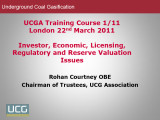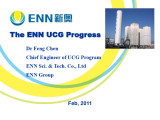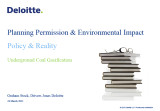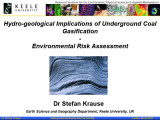TO
| Title | Date | Subject | Description | ||
|---|---|---|---|---|---|
| 201 |
 |
Pyrolysis of bitumen impregnated sandstones: A comparison of fluidized-bed and rotary-kiln reactors | 1991-04 | bitumen pyrolysis; bitumen impregnated sandstones; fluidized-bed reactor; rotary-kiln reactors; reactor comparison; hydrocarbon recovery; processing strategies | The recovery of hydrocarbon values from the bitumen impregnated sandstones of Utah can be accomplished by any of several mining-surface recovery techniques. These processing strategies include aqueous separation, diluentassisted aqueous separation and solvent extraction of the bitumen from the sand ... |
| 202 |
 |
Pyrolysis of oil shale from the Whiterocks tar sand deposit in a rotary kiln | 1992-04 | oil shale pyrolysis; Whiterocks tar sand deposit; rotary kiln; hydrocarbon value recovery; oil sands | The recovery of hydrocarbon values from the oil sands of Utah can be accomplished by any of several mining-surface recovery techniques. These processing strategies include aqueous separation, diluent-assisted aqueous separation and solvent extraction of the bitumen from the sand, and pyrolysis of th... |
| 203 |
 |
Properties of GPC separated maltene fractions derived from Utah and Athabasca bitumen | 1989-11-17 | GPC; maltene fractions; Utah bitumen; Athabasca bitumen; oil sands; Gel Permeation Chromatography | This work deals with bitumens derived from two different types of oil sands: 1) Athabasca from the HcHurray formation in Alberta, Canada and 2) from the Unita basin in the green River formation, Utah, USA. Maltenes separated from these two bitumen were fractionated by Gel Permeation Chromatography (... |
| 204 |
 |
Recovering oil from tar sand using the ROPE process | 1988-12 | oil recovery; tar sand; ROPE process; oil from tar sands; Asphalt Ridge tar sands; Sunnyside tar sands; Athabasca tar sands | Western Research Institute (WRI) is developing a new pyrolysis process called ROPE© (Recycle Oil Pyrolysis and Extraction) for recovering products that require a minimum of upgrading to produce finished marketable fuels (motor gasoline, diesel and aviation fuels). Three tar sand resources - Asphalt... |
| 205 |
 |
New algorithms for steam assisted gravity drainage using combinations of vertical and horizontal wells | 1994-04 | steam assisted gravity drainage; vertical and horozontal wells; SAGD; oil sand reservoirs; vertical injectors | New algorithms have been presented for steam assisted gravity drainage (SAGD) in oil sand reservoirs using vertical injectors-producers and vertical injectors-horizontal producers. Although SAGD with a pair of horizontal wells has been reported to be promising, it may be necessary to use a combinati... |
| 206 |
 |
Similitude studies in three-phase ebullieted bed reactors | 1993-05 | similitude studies; three-phase ebullieted bed reactors; reactors; processing heavy oils, bitumen, and bitumen derived liquids | The length of a commercial reactor, in three-phase ebullieted bed processes with pelleted catalysts, for the processing of heavy oils, bitumen and bitumen-derived liquids are long due to the requirement of low space velocities. The reactor length, for laboratory scale studies of such processes, can ... |
| 207 |
 |
U.S. tar sand oil recovery projects--1984 | 1984-11 | U.S. tar sand; oil recovery projects; Eastern Oil Shale Symposium; alternate liquid hydrocarbon sources; oil shale; coal; tar sand | With a temporarily stable world oil price, which is lower than estimated values for most unconventional liquid hydrocarbon fuels, interest and activity in U. S. tar sands has declined. Data are reported for 52 projects involving in situ, mining and plant extraction, and modified in situ technologies... |
| 208 |
 |
U.S. Energy Research and Development Administration field experiment | 1976-06 | U. S. energy research and development; field experiment; reverse combustion process; oil recovery; tar sand; alternative forward process | The Laramie Energy Research Center of the U. S. Gov Research and Development Administration is equiping a small-scale field experiment to test the reverse combustion process to recover oil from tar sand. This field experiment, the first of a planned series, will extend the results of laboratory work... |
| 209 |
 |
Control of geological carbon sequestration in the western United States | 2011-05 | coal; carbon dioxide; electric utilities; carbon sequestration; sequestration; geological sequestration; climate change | In the near future, the use of coal may be legally restricted due to concerns over the effects of its combustion on atmospheric carbon dioxide concentrations. Carbon capture and geologic sequestration offer one method to reduce carbon emissions from coal and other hydrocarbon fuel. While the federal... |
| 210 |
 |
State and regional control of geological carbon sequestration (Part I) | 2011-05 | state and regional control; geological carbon sequestration; hydrocarbon fuel; carbon capture; geologic sequestration | In the near future the use of coal may be legally restricted due to concerns over the effects of its combustion on atmospheric carbon dioxide concentrations. Carbon capture and geologic sequestration offer one method to reduce carbon emissions from coal and other hydrocarbon fuel. While the federal ... |
| 211 |
 |
United States tar sands | 1982 | U.S. tar sands; tar sands; Interstate Oil Compact Commission | The term 'Tar Sands' is a catch-all misnomer that includes asphaltic and oil-impregnated sandstones, siltstones, and other elastics and even limestones and other carbonates - but not "oil shales" or man-made paving material. A press agent might entitle this paper "OIL, the Overlooked Billions of Bar... |
| 212 |
 |
Oil-impregnated rocks of Utah: USERDA field experiment to recover oil from tar sand | 1976-07 | oil-impregnated rocks; Utah; USERDA; field experiment; recover oil from tar sand; oil recovery | The Laramie Energy Research Center, of the U. S. Energy Research and Development Administration, is equipping a field experiment to test the reverse combustion process for recovery of oil from a tar sand on a 10-acre site on the Northwest Asphalt Ridge deposit near Vernal, Utah. A tar sand section 1... |
| 213 |
 |
U.S. tar sand oil recovery projects | 1982 | tar sands; U.S. tar sand oil recovery; oil recovery; U.S. energy demands; crude oil reserves; U.S. tar sands resource | The increasing U.S. energy demands, decreasing conventional crude oil reserves, and decontrol of crude oil prices have resulted in significant numbers of projects in U.S. tar sands. Data are reported for 62 projects involving both in situ and mining and plant extraction technologies. The data includ... |
| 214 |
 |
U.S. tar sand oil recovery projects (1982) | 1982-02 | U.S. tar sand; oil recovery; energy demand; conventional petroleum decrease; less conventional energy sources; tar sand resource | As the demand for energy in the United States increases and the reserves of conventional petroleum decrease, the interest in development of less conventional energy sources is increasing dramatically. This interest, plus the recent decontrol of crude oil prices, has resulted in widespread activities... |
| 215 |
 |
Getting from here to there: Devising an optimal regulatory model for CO2 transport in a new carbon capture and sequestration industry | 2010 | regulatory model for CO2 transport; new carbon capture and sequestration; CCS; regulatory model | If CCS is to become a broad-scale commercial industry in time to meet the need for climate change mitigation, the United States must adopt a regulatory model that will allow for efficient construction of critical infrastructure. A well-crafted regulatory framework gives private would-be CCS operator... |
| 216 |
 |
Surface and sub-surface gasification process engineering | 2011-03-21 | surface gasification; sub-surface gasification; process engineering | UCG Training Course, March 21-22, 2011, Deloitte, London. |
| 217 |
 |
Training Course Full Program: Training Course on Underground Coal Gasification | 2011-03-21 | training course program; underground coal gasification; UCG | UCG Training Course, March 21-22, 2011, Deloitte, London |
| 218 |
 |
High resolution geophysical monitoring of geomechanical, thermal, and hydrogeological processes associated with UCG (and CCS) processes | 2011-03-21 | UCG; underground coal gasification; UCG processes; CCS processes; geophysical monitoring; geomechanical processes; thermal processes; hydrogeological processes | UCG Training Course, March 21-22, 2011, Deloitte, London |
| 219 |
 |
Investor, Economic, Licensing, Regulatory and Reserve Valuation Issues | 2011-03-21 | underground coal gasification; UCG; valuation issues; financial modelling; UCG sites | UCG Training Course, March 21-22, 2011, Deloitte, London |
| 220 |
 |
What is UCG? An engineering perspective | 2011-03-21 | UCG; underground coal gasification; syngas; horizontal and directional drilling; engineering | UCG Training Course, March 21-22, 2011, Deloitte, London |
| 221 |
 |
The ENN UCG Progress | 2011-03-24 | UCG process; ENN group; underground coal gasification | 6th Annual International Conference & Workshop on Underground Coal Gasification, 23rd - 24th March 2011 |
| 222 |
 |
Wildhorse Energy - A major energy opportunity in central Europe | 2011-03-23 | Wildhorse Energy; central Europe; Eskom project; UCG; underground coal gasification; Varalja Coal resource ; drilling | 6th Annual International Conference & Workshop on Underground Coal Gasification, 23rd - 24th March 2011 |
| 223 |
 |
Planning permission & environmental impact: Policy & reality | 2011-03-24 | planning permission; environmental impact; UCG; underground coal gasification; Drivers Jonas Deloitte | 6th Annual International Conference & Workshop on Underground Coal Gasification, 23rd - 24th March 2011 |
| 224 |
 |
Numerical simulation of combined reverse combustion and steamflooding for oil recovery in a Utah tar sand | 1985-04 | numerical simulation; combined reverse combustion; steamflooding; oil recovery; Utah tar sand; tar sand; Asphalt Ridge; LETC; Laramie Energy Technology Center | This paper presents the design of the U.S. DOE Laramie Energy Technology Center's (LETC) Project TS-4, which involves numerical simulation of both in-situ reverse combustion and steamflooding. The simulator showed that the combustion could be limited and contained in a middle 10-ft [3-m] interval wi... |
| 225 |
 |
Hydro-geological implications of Underground Coal Gasification: Environmental risk assessment | 2011-03-21 | hydro-geological implications; underground coal gasification; UCG; environmental risk assessment; hydrological processes; hydrochemical processes | UCG Training Course, March 21-22, 2011, Deloitte, London |
